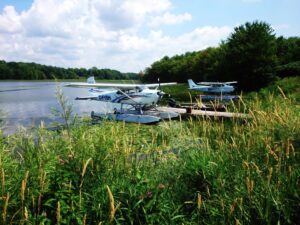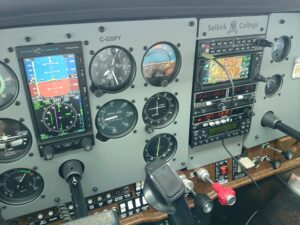Today I experienced my first live dose of human factors. I had previously promised to fly my friend back home as she didn’t get to see her family much because they live 4 hours away. I planned the flight, reserved the aircraft, and triple-checked everything before I left. I then picked my friend up and another along the way; the original plan had been for my two friends to meet me at the airport to save time as I was coming back down from Orillia after a days’ worth of float flying. After this minor setback, we eventually reached the airport and had signed out the aircraft. I did my usual walk around and had noticed that I only had a quarter tank left of fuel – great, another delay, I’ll have to change my flight plan.
While I was having the plane refuelled, my two passengers decided to go to the washroom quickly. Ten minutes later, I had filled the aircraft, and my passengers were still nowhere to be seen. I didn’t want to leave the plane as that would mean I would lose sight of it and have to do another walk around, which would delay me further. My revised takeoff time came and passed, and I yet again updated my flight plan accordingly. After multiple attempts to phone my passengers, I eventually got a hold of them and got them to return after another ten minutes. Everyone then jumps in and buckles up, excited for the flight – my first human factors experience comes is already coming together.
I go through my routine checklists and begin to start the cold aircraft engine. I hastily threw on the fuel pump and waited for my fuel flow gauge to register; it didn’t. I look down and realize that I forgot to apply a full-rich mixture – awesome, I somehow skipped that in my checklist. The fuel then starts to flow, and I continue cranking the engine; it won’t catch. I figured I simply didn’t have enough fuel in there because of my mistake. So I pumped more fuel in, making sure I had the mixture in this time. I start to crank it again, and still nothing – I’m starting to get frustrated. Luckily there was a nice older and much more experienced pilot standing nearby. He yells to me that I’ve flooded the engine; there’s fuel dripping onto the apron at this point.
The kind pilot instructs me to crank the engine and pump the throttle until it catches. After a few seconds of hearing that electric motor turn the engine over and over, it finally catches and sputters to a strong start. With an embarrassed red face, I look back at my passengers and ask if they are ready to go. I taxi to the run-up area and perform my standard check; everything is running fine and in the green. We take off, and I call London Radio to confirm that my flight plan has been opened. I then started off in the direction I had planned for and contacted Toronto to get the proper clearances. An hour and a half later, and we were there, just coming into the airport just before night had fallen.
While entering the circuit, I switch to the ARCAL frequency and click the microphone five times – nothing, the airport beacon is on, but no runway lights. I figure I must have miscounted somehow and toggled it again; suddenly, a whole heap of nothing happened yet again. I do this probably at least five more times before deciding to call the airport in an attempt to ask what is wrong. Unfortunately for me, however, their switchboard operator didn’t know who I should talk to. I’m starting to sweat; the first time I take one of my friends on a plane and promise that I can get her to her family – which at this time is sitting in their car on the ground below watching us circle – I would have to turn around and give a big fat nope; I couldn’t do that! I then start to create a plan B: land at another airport.
I pull out my map and scan all around for another place to land while our plane circles. The next closest place to land is an hour away by car and is across the American border; I can’t do that either. I looked at my watch and back outside – I had looked up what time the sun was setting earlier and calculated what time night technically started. I still had fifteen minutes before the cut-off – I’d have to do this quick. I do a low-and-over pass first, then make my final landing; nice and smooth, and no problems with visibility. I quickly taxi over to the apron and shut down. I practically throw one of my passengers out and proceed to do another quick walk around. I say goodbye to her and her family while I simultaneously activate my second flight plan and jump back in the Cessna with my last passenger. I look back at my watch and see that I have less than ten minutes left. I do a quick run-up while I’m rolling this time and get to the three-quarter point on the runway. I knew this would still be enough room to take off and land twice, but it still made me extra cautious. I do a short field takeoff just for extra comfort and lift off before I even reach the apron.
I start a steady climb and get on the radio with London once again. I tell them that I want to make sure my new flight plan is open and my previous one is closed; what I was told next made my stomach tighten. I was told that I had hit my search and rescue time, and they were just about to call my cellphone before they sent out the troops. I felt terrible; I felt like a jerk, an inexperienced jerk. I apologized, and they told me it was fine as I had caught them at just the right time – I apparently had a minute or two left. I had not accounted for all that circling that I had done before landing. I’ve got to stay focused though, I have to contact Montreal to obtain clearances back to Toronto. Except to my realization, I had accidentally changed the standby frequency where I had been storing it, and of course, I had not written it down when I received it. I’m now anxious that I’m breaking another rule and flying in someone’s airspace. I frantically look through my CFS and come across a frequency that I think it was. I tune it in and hear that it’s someone speaking in French to Toronto – this can’t be it! I tried to think back to what I had listened to a few hours before; luckily, the frequency returned to me, and I punched it in. I got a hold of the correct people and received the clearances that I needed.
I can finally relax now and enjoy the rest of my flight. I start to scan my gauges and stop upon my fuel gauge; it’s getting low. I start doing some calculations and see that I will still have two hours of fuel when I land – no worries, but I might as well climb higher to burn less; so I obtain another clearance easily as the skies were quiet. I then glance back at my watch and see that I won’t be landing until half an hour after my local club would prefer me to (they wanted to go home early). Not wanting to disappoint them either, I try to fly as fast as possible, throwing out my scenic route for a direct one. I eventually land with my last passenger and call it a day.
I had studied CRM (crew resource management) and human factors all year long, but I never really realized what it was actually like until I experienced it for real. While assessing my flight later, I realized that I hadn’t done anything wrong; no rules were broken, and no harm to anyone. I had worked myself up by making these tiny mistakes into huge problems in my mind; I wanted to impress my friends. I realized that I had let time get the best of me, making me worry that something would go wrong, something terrible, something embarrassing. I now really see that the best thing to do is take my time, no matter how hard it may be. If I had relaxed and started the engine properly, I wouldn’t have flooded it, I would have been in the air much sooner, which would have made my worries about being too dark disappear, and it would have eliminated the circling. This would have eliminated the delay in closing my flight plan, my concerns about fuel, runway length, and even getting back to the club on time. It’s really crazy when I think about how one tiny little problem snowballed into a bigger problem, even if it was all in my head. This is the exact same stuff that I learned in class, but now I have a real-life experience. This flight turned out to be an invaluable learning experience, and I won’t ever forget what it has taught me.






